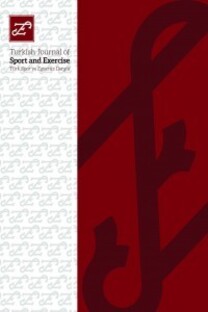Review Of The Emotional Intelligence And Self-Leadership Levels Of Students At The Faculty Of Sports Sciences
Spor Bilimleri, Duygusal zekâ, Öz-liderlik
Review Of The Emotional Intelligence And Self-Leadership Levels Of Students At The Faculty Of Sports Sciences
Sport Sciences, Emotional Intelligence, Self-Leadership Spor Bilimleri, Duygusal zekâ, Öz-liderlik,
___
- 1. Altınışık Ü, Çelik A. Spor Bilimleri Fakültesi Öğrencilerinin Liderlik Yönelimleri İle Duygusal Zeka Düzeyleri Arasındaki İlişkinin İncelenmesi. Spor Bilimleri Araştırmaları Dergisi, 2022; 7(1), 225-236.
- 2. Aydın F. Akademik Başarının Yordayıcısı Olarak Akademik Güdülenme, Öz-yeterlik ve Sınav Kaygısı. Yüksek Lisans Tezi. Ankara: Hacettepe Üniversitesi Sosyal Bilimler Enstitüsü, 2010.
- Yayın Aralığı: 3
- Başlangıç: 1999
- Yayıncı: Selçuk Üniversitesi, Spor Bilimleri Fakültesi
Training Monitoring And Effect Of Training Variables On Wellness Score In Elite Male Fencers
Enver YILDIRIM, Ş. Alpan CİNEMRE, Hatice Yağmur ZENGİN
Investigation of Fair Play Behaviors of Secondary School Students Participating in School Sports
Ahmet TEMEL, İbrahim Umran AKDAĞCIK
Tuncay SARIİPEK, İbrahim Bülent FİŞEKÇİOĞLU, Hakan Salim ÇAĞLAYAN
Mehmet SARIKAYA, Mehmet Şerif ÖKMEN, Gökmen KILINÇARSLAN, Akan BAYRAKDAR
Examining the Relationship of Some Performance Tests Applied to Young Soccer Players
Veysel BÖGE, Bekir MEHTAP, Gökhan HADİ, Erkan BÜTÜN
Ferhat BUYUKKALKAN, Kıvanç SEMİZ
Mental Toughness Levels of Male and Female Football Players
Berzan ŞİMŞEK, Alpaslan KARTAL, Samet AKTAŞ
A Review Study of Physical Education Pedagogy in Turkey
Ekrem Yasin TABAK, Mehmet DALKILIÇ, Erhan DEVRİLMEZ, Fatih DERVENT
The Effect of Participation in Regular Tennis Exercise on Sportsmanship
Erkan GÜNAY, Recep ÖZÇELİK, Egemen MANCI, Caner ÇETİNKAYA, Cem BEDİZ
